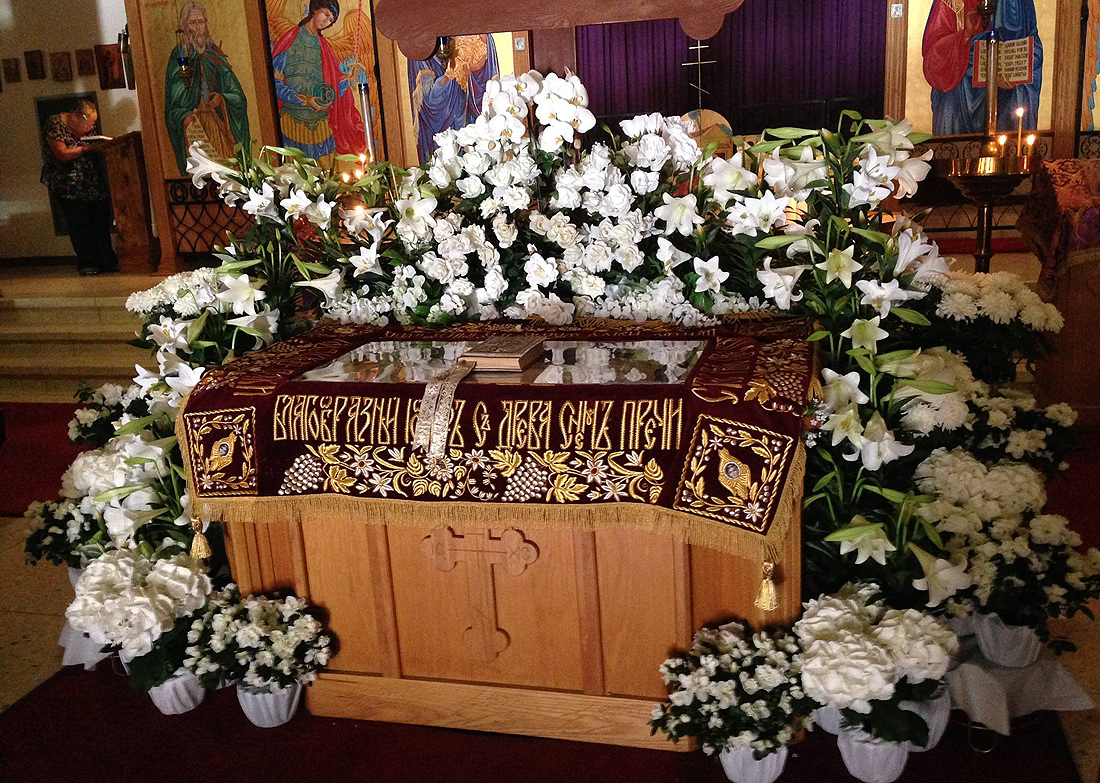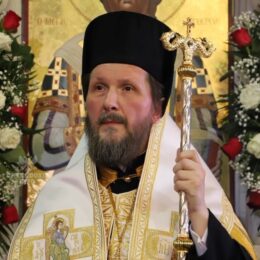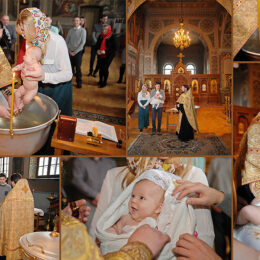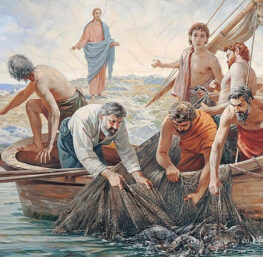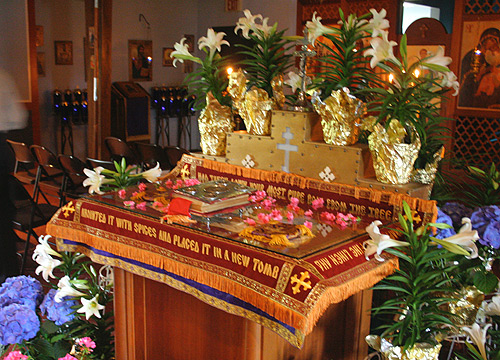 On Friday night, the Matins of Holy and Great Saturday, a unique service known as the The Lamentations at the Tomb (Epitáphios Thrēnos) is celebrated. This service is also sometimes called Jerusalem Matins. Much of the service takes place around the tomb of Christ in the center of the nave. A unique feature of the service is the chanting of the Lamentations or Praises (Enkōmia), which consist of verses chanted by the clergy interspersed between the verses of Psalm 119 (which is, by far, the longest psalm in the Bible).
On Friday night, the Matins of Holy and Great Saturday, a unique service known as the The Lamentations at the Tomb (Epitáphios Thrēnos) is celebrated. This service is also sometimes called Jerusalem Matins. Much of the service takes place around the tomb of Christ in the center of the nave. A unique feature of the service is the chanting of the Lamentations or Praises (Enkōmia), which consist of verses chanted by the clergy interspersed between the verses of Psalm 119 (which is, by far, the longest psalm in the Bible).
At the end of the Great Doxology, while the Trisagion is sung, the epitaphios is taken in procession around the outside the church, and is then returned to the tomb. Some churches observe the practice of holding the epitaphios at the door, above waist level, so the faithful most bow down under it as they come back into the church, symbolizing their entering into the death and resurrection of Christ.
The epitaphios itself represents the body of Jesus wrapped in a burial shroud, and is a roughly full-size cloth icon of the body of Christ. Then the priest may deliver a homily and everyone comes forward to venerate the epitaphios. In the Slavic practice, at the end of Vespers, Compline is immediately served, featuring a special Canon of the Crucifixion of our Lord and the Lamentation of the Most Holy Theotokos by Symeon the Logothete.
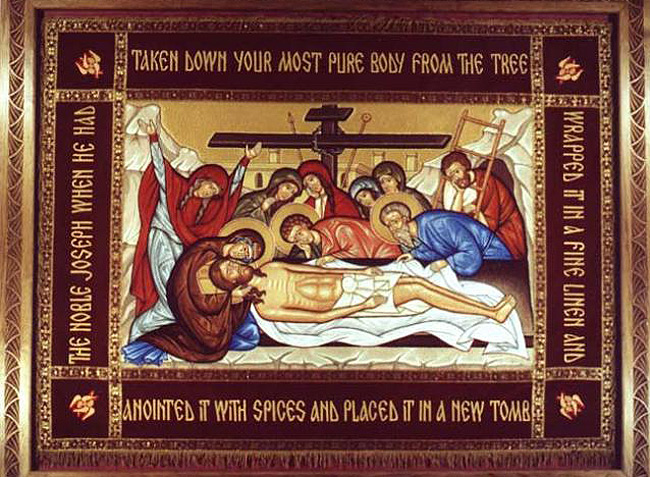
Before the service begins, a “tomb” is erected in the middle of the church building and is decorated with flowers. Also a special icon which is painted on cloth (in Greek, epitaphios; in Slavonic, plaschanitsa) depicting the dead Saviour is placed on the altar table. In English this icon is often called the winding-sheet.

The Matins of Holy Saturday are usually celebrated on Friday night. They begin in the normal way with the singing of God is the Lord, the troparion The Noble Joseph, and the following troparia:
When Thou didst descend to death 0 Life Immortal, Thou didst slay hell with the splendor of Thy Godhead! And when from the depths Thou didst raise the dead, all the powers of heaven cried out: O Giver of Life! Christ our God! Glory to Thee!
The angel standing by the grave cried out to the women: Myrrh is proper for the dead, but Christ has shown himself a stranger to corruption.
In place of the regular psalm reading the entire Psalm 119 is read with a verse praising the dead Saviour chanted between each of its lines. This particular psalm is the verbal icon of Jesus, the righteous man whose life is in the hands of God and who, therefore, cannot remain dead. The Praises, as the verses are called, glorify God as “the Resurrection and the Life,” and marvel at his humble condescension into death.
There is in the person of Jesus Christ the perfect unification of the perfect love of man toward God and the perfect love of God toward man. It is this divine human love which is contemplated and praised over the tomb of the Savior. As the reading progresses the Praises become shorter, and gradually more concentrated on the final victory of the Lord, thus coming to their proper conclusion:
I long for Thy salvation, 0 Lord, Thy law is my delight (Psalm 119:174).
The mind is affrighted at Thy dread and strange burial.
Let me live, that I may praise Thee, and let Thy ordinances help me (119:175).
The women with spices came early at dawn to anoint Thee.
I have gone astray like a lost sheep, seek Thy servant, for I do not forget Thy commandments (119:176).
By Thy resurrection grant peace to the Church and salvation to Thy people!
Canon of Holy Saturday
Ode 1
Of old Thou didst bury the pursuing tyrant beneath the waves of the sea.
Now the children of those who were saved bury Thee beneath the earth,
but with the maidens let us sing to the Lord,
for gloriously has He been glorified.
Ode 3
Thou didst suspend the earth immovably upon the waters.
Now creation beholds Thee suspended on Calvary.
It quakes with great amazement and cries:
“None is holy but Thee, O Lord.”
Ode 4
Foreseeing Thy divine humiliation on the cross,
Habakkuk cried out trembling;
“Thou didst shatter the dominion of the mighty by
joining those in hell as the almighty Lord.”
Ode 5
Isaiah saw the never-setting light of Thy compassionate
manifestation to us as God, O Christ.
Rising early from the night he cried out:
“The dead shall arise.
Those in the tombs shall awake.
All those on earth shall greatly rejoice.”
Ode 6
Jonah was caught but not held fast in the belly of the whale.
He was a sign of Thee who hast suffered and accepted burial.
Coming forth from the beast as from a bridal chamber,
he called out to the guard:
“By observing vanities and lies you have forsaken your own mercy.”
Ode 7
Inexpressible wonder!
In the furnace Thou didst save the holy youths from the flame.
Now Thou art placed in the grave as a lifeless corpse,
for the salvation of us who sing:
“Blessed art Thou, O God, our Redeemer!”
Ode 8
Be amazed, O heavens!
Be shaken, O foundations of the earth!
Behold, He that dwell in the highest
is numbered among the dead and sheltered in a lowly tomb.
Bless Him, O youths, Praise Him, O priests!
O people, exalt Him above all forever!
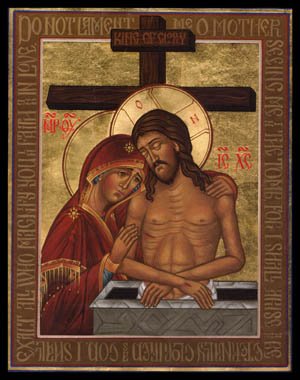
Ode 9
“Do not lament Me O Mother, seeing Me in the tomb,
The Son conceived in the womb without seed.
For I shall arise and be glorified with eternal glory as God.
I shall exalt all who magnify you in faith and in love.”
After the final glorification of the Trinity, the church building is lighted and the first announcement of the women coming to the tomb resounds through the congregation as the celebrant censes the entire church. Here for the first time comes the clear proclamation of the good news of salvation in Christ’s resurrection.
Gospel Reading – Mattew 27:62-66
On the next day, which followed the Day of Preparation, the chief priests and Pharisees gathered together to Pilate, saying, “Sir, we remember, while He was still alive, how that deceiver said, ‘After three days I will rise.’
Therefore command that the tomb be made secure until the third day, lest His disciples come by night and steal Him away, and say to the people, ‘He has risen from the dead.’ So the last deception will be worse than the first.”
Pilate said to them, “You have a guard; go your way, make it as secure as you know how.” So they went and made the tomb secure, sealing the stone and setting the guard.
More on the Holy Saturday services available here.
The Lamentations
(1) In the grave they laid Thee,
O My Life and My Christ
And the armies of the Angels was so amazed,
As they sang the praise of Thy submissive love!
(2) O my sweet Lord Jesus
My salvation, my light
How art Thou now by a grave and its darkness hid?
How unspeakable the mystery of Thy Love!
(3) Gone the Light the world knew.
Gone the Light that was mine.
O my Jesus, Thou art all of my heart’ desire;
So the Virgin spake lamenting at Thy grave.
(4) Who will give me water,
For the tears I must weep?
So the maiden wed to God cried with loud lament;
That for my sweet Jesus I may rightly mourn.
(5) All we call Thee blessed,
Theotokos, most pure.
And with faithful hearts we honour the burial
Suffered three days by Thy Son who is our God.
(6) How O life canst Thou die?
In a grave how canst dwell?
For the proud domain of death Thou destroyest now
And the dead of hades makest Thou to rise.
(7) Now we magnify Thee,
O Lord Jesus our King.
And we venerate Thy passion and burial,
For therewith hast Thou delivered us from death.
Great & Holy Friday Lamentations
The Noble Joseph
Holy Friday Praises (Holy Saturday Matins) – Full Service
The Lamentations at the Tomb
Lamentation 1st Stasis – in English
Lamentation 2nd Stasis – in English
Lamentation 3rd Stasis – in English (at 54:55 in video)
The Lamentations – in Romanian
Lamentations at the Tomb – First Stasis in Romanian – Prohodul Domnului (stance 1)
Lamentations at the Tomb – Second Stasis in Romanian – Prohodul Domnului (stance 2)
